



At a time when startup funding is losing steam and a focus on profitability has emerged, venture capitalists (VCs) are taking more interest in SaaS (software as a service) companies as they are seen to be running leaner businesses than subsidy-heavy segments like consumer tech and fintech, say industry insiders.
“A lot of the crossover funds are looking at SaaS as a hard asset. Big bets across all tech segments are not happening. But when it comes to SaaS, investors are at least ready to seriously consider a $100-million cheque even now,” said an investment banker.
“And these are people who were primarily interested in themes like consumer tech, edtech and fintech just some time ago,” he added.
“The thing about SaaS is there is no fooling around about traction and cutting costs is relatively easier. The revenues start coming in early and that is what validates your product-market fit at an early stage,” said an analyst at one of the most prolific SaaS investors in the country.
“As such, I am seeing that investors who got over-indexed on a lot of edtech and D2C ideas last year are suddenly showing up to SaaS cap tables. They don’t necessarily understand SaaS well, but entrepreneurs are playing ball as a level of funding scarcity has kicked in,” he added.
Already, the SaaS segment is in pole position this year as it saw around 140 deals in the first six months till June. In the last three and a half years, the number of SaaS unicorns in India grew from a mere two businesses to 20, said a report by Bessemer Venture Partners.
In the first four months of 2022 alone, India saw four new names added to this list. Moreover, SaaS accounted for six of the 18 unicorns minted this year.

Deal dimensions
Amid the tech funding rush last year, the SaaS sector saw valuations skyrocket. In February 2021, the top quartile of SaaS companies listed on Nasdaq was trading at 25 times forward revenues. And top private investments hit valuations of 100 times forward revenue mid-year.
“We did not make any new SaaS investments last year as we could not build confidence around the high valuations. Now we are back to doing deals in the space,” said Ashish Kumar, partner at the Nandan Nilekani-backed VC firm Fundamentum.
Freshworks, a Chennai-based SaaS company that went public in the US in September 2021, priced its initial public offering at 30 times annualised revenue. Around the same time, Bengaluru-based Postman raised a VC round at over $5 billion valuation that was reportedly priced at more than 100X of revenue.
“SaaS was also swept into the insanity that prevailed in the market. However, things are returning to normal and the multiples have fallen by 70 percent or more in most cases,” said the analyst quoted earlier.
But, he contended, that with the tech funding crunch expected to go on for more than a couple of quarters, SaaS multiples have the best chance of remaining stable around the median of 5X while other segments drop from current levels.
“The thing to understand here is that SaaS has a comparatively lower loss ratio. If you look at a cohort of 30 SaaS startups, only five or 10 may go completely off track and shut down whereas the number will be a lot higher in consumer tech,” he said.
The investment banker quoted earlier agreed. “I am currently working on a $200-million acquisition and it is happening at 5X of annual recurring revenue. In that sense, SaaS seems to be holding on well. Its valuation multiples are the most protected at this point,” he said.
The funding equation in early-stage deals has also changed in the last couple of months. Earlier, it had become commonplace for a SaaS company with $100,000 in annual recurring revenue (ARR) to seek a $15-million valuation. Now, they need to show $500,000 in ARR to command a $5-6 million valuation.

Back to leaner models
Industry insiders say that the excesses of the past are getting corrected. While SaaS companies have always treaded with caution while scaling up, some of them had started behaving like consumer tech peers amid the funding rush.
“A lot of them were expanding into verticals that did not seem like the logical next step. They were giving away freebies in the name of product-led growth, hiring extra hands for content marketing,” said a senior executive at a SaaS unicorn.
“You have to understand that 10X growth may happen for a SaaS company over 10 years in the best cases, but definitely not four or five years like consumer tech,” he added.
However, the good thing about SaaS is that it is not too hard to rein in cash burn. There are no big-ticket advertising commitments or operations personnel spread across multiple cities. For companies catering to developers by building tools for them, marketing is thought to be a no-go.

“Developers don’t like to be told what tools to use. It is best to let them come to your product via word of mouth,” said a founder in the space.
Kumar of Fundamentum said, “Last year was an aberration when people stopped looking at profitability in SaaS. This is not a business segment where profitability can take a back seat.”
“The thing about consumer businesses is that you won’t survive if you don’t have a high market share. But SaaS is a much more secular market share business which also makes it relatively easier to survive a slowdown for a young startup in the space,” he added.
Discover the latest Business News, Sensex, and Nifty updates. Obtain Personal Finance insights, tax queries, and expert opinions on Moneycontrol or download the Moneycontrol App to stay updated!
Find the best of Al News in one place, specially curated for you every weekend.
Stay on top of the latest tech trends and biggest startup news.